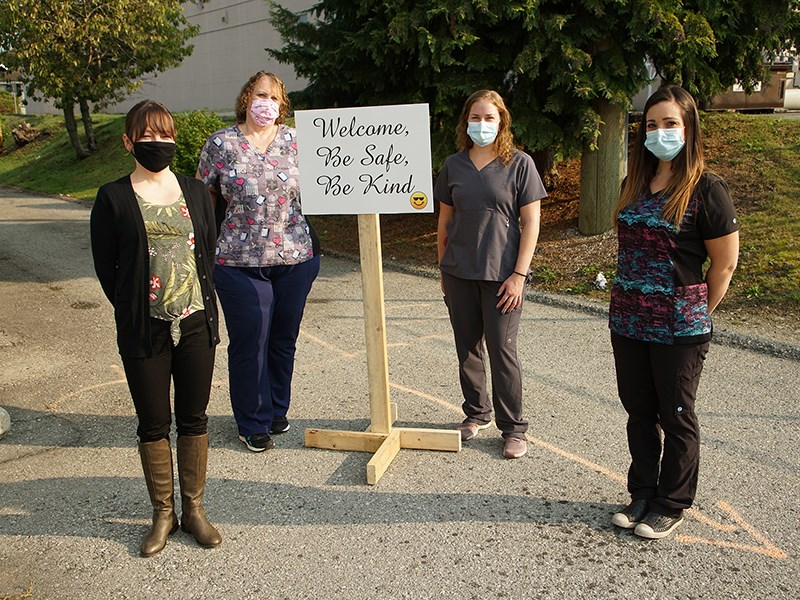As COVID-19 has arrived in our community, we have entered a new phase of the pandemic, and it’s one that requires each of us to find courage, patience and tolerance when that is perhaps the most difficult thing to do.
We learned last week that Dr. Bonnie Henry is not only experiencing harassment from some members of the public, but also death threats. While Dr. Henry is internationally recognized, both for her expertise in public health and her compassionate leadership, she was reportedly not surprised by these abuses. Her famous saying: “Be kind, be calm and be safe” no longer appears to be simply an inspiring slogan; it’s also a warning.
The instinctive human reaction to threat is known as the “fight or flight” response, and it is hardwired in our brains and bodies, allowing for strength and speed in times of danger. Fear (flight) and anger (fight) are often two sides of the same response. While helpful in times of immediate danger, they are not as productive when a threat is ongoing, like in a pandemic. None of us do our best reasoning in these stress states. It is harder to listen, process information, appreciate complexity and empathize with others.
We may dismiss these personal threats to Dr. Henry as acts of a few extreme individuals, but when COVID-19 arrived in our region recently, we saw how easily fear and anger could escalate. Even in our medical offices, where we have noticed a rise in irritable interactions with our staff for months now, over the past two weeks more people have been aggressive and even verbally abusive. Some retailers have reported similar experiences.
Our health authority has also been the focus of frustration and anger for many. After months of preparation and learning, our testing, contact tracing, emergency supports and many other plans and protocols were enacted efficiently to contain and manage COVID-19 exposures in our area.
Unfortunately, there was not enough communication of these actions to the public. Consequently, many people felt unsure of how the local cases were being managed, how to respond, or what to expect next. As we recognize the intensive work done these past few weeks, we also recognize the need to press for better information sharing.
Thankfully, our uncertainty during this difficult time was balanced by something else: compassion. We saw it both from leaders and residents, particularly in Tla’amin Nation. It was not a response of blame or stigma, but rather of kindness and support. Communicated in both actions and words, this is an example we can all learn from moving forward in these challenging times.
COVID-19 is now considered endemic in BC, meaning we don’t believe we can eradicate it with our current tools, at least not in the foreseeable future. So, we are left to live with this virus and a baseline risk that just won’t go away.
Fortunately, we’ve learned a lot in the past six months about how to do this. It was not so long ago there were lineups at grocery stores and no toilet paper or canned goods on shelves. Schools were closed, most businesses were shuttered, and almost all non-urgent medical procedures were cancelled. Since then we’ve seen major adaptations in our health-care services, our schools and our workplaces, most of which are now open.
Despite the expected fall surge in new COVID-19 cases, over the past week BC has once again managed to flatten its curve and the number of active cases in the province is now falling. It is good to recognize our progress, but we can’t be complacent. We should continue to ask more of our public institutions, and of ourselves. If we don’t, we risk losing what we have gained.
We’ve learned that we can personally do a great deal to control our own risks – both the risk of exposure, and the risk of spreading this virus unknowingly. We know there is no single measure that can completely protect us. But each action we take is additive, and in combination our actions are powerful.
Even in Powell River, we cannot eliminate the risk of COVID-19. Our new normal is about balancing harms of restrictions with harms of more cases. Open communication, quality information-sharing and thoughtful discussions are tools that will help us to move out of our stress states and find sustainable ways to achieve that balance.
None of us can force others to take action. But we can lead by example, and perhaps most importantly, with an attitude of compassion. Living with complexity and change will be easier, and more effective, if we do it as a team.
“Be kind, be calm and be safe” is both a warning and a way forward. It’s an appeal to our better natures. Being kind and calm makes us safer. And we are safer together.
On behalf of local physicians and nurse practitioners, Powell River Division of Family Practice is working to improve communications around local COVID-19 information. Find information on symptoms, testing options and other updates at divisionsbc.ca/powell-river, on Facebook and Instagram @prdivisionoffamilypractice or via the regular doctors’ notes newsletter (subscribe on the website).
For a monthly update of local cases around the province, including the Powell River local health area, go to bccdc.ca/health-info/diseases-conditions/covid-19/data (local health area map). All known school exposures within VCH are now viewable at vch.ca/covid-19/school-exposures.
~ Powell River Physicians COVID-19 Steering Group



